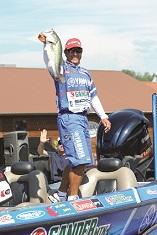

Ask the Masters
America offers a vast array of fishing types and opportunities, both saltwater and freshwater. But of all kinds of fishing, bass has hooked the hearts of the greatest number of anglers. In each bimonthly AnglerSurvey during 2014, bass led the list of top targeted freshwater species.[1] What’s more, bass anglers might be the biggest spenders overall, says Jon Stewart, director, B.A.S.S. Nation.
“Bass anglers probably spend more money than anglers who chase a different type of fish, simply because they travel so much,” says Stewart. “There’s a bass tournament somewhere every weekend on multiple lakes, which isn’t the case for other types of fishing.”
B.A.S.S., the Bass Anglers Sportsman Society, started in 1967 with a 107-angler tournament. Today, the organization produces a weekly ESPN2 program, “The Bassmasters,” has bass fishing clubs in 46 American states and ten other countries, and executes some of the sport’s most prominent tournaments, including the Bassmaster Tournament Trail, the Bassmaster Classic and the Bassmaster Elite Series, considered fishing's world championship by most in the industry.

“The Bassmaster Classic is our largest event, and it’s really a citywide convention,” Mulone explains. “Not only do we need a lake or river to host the tournament, but also we need a large convention center, an arena for weigh-ins, thousands of hotel rooms and an airport.”
The most recent Bassmaster Classic took place this February on Lake Hartwell in Anderson, South Carolina, an event made possible by a partnership between Anderson and nearby Greenville.
“Anderson had the lake, and Greenville had the rest,” Mulone says. “You can’t have one without the other.”
Bassmaster’s other events include the ESPN2 televised Elite Series, the Open Series, where anglers can qualify for the Elites, high school and College B.A.S.S. tournaments, plus B.A.S.S. Nation tournaments, where amateurs compete in state and regional tournaments and can qualify for the Classic. Even though they are serving a different set of anglers, their standards do not change. “No matter what kind of tournament, we run all our events the same and keep them as close as we can to the same experience,” says Stewart. These events have some needs that differ from the Bassmaster Classic, such as not requiring an expo, but size still can be a challenge.
“Our high school tournaments in particular are becoming so popular, we have a hard time getting a place big enough to do the registration and meetings,” says Stewart. “In these tournaments, we might have 200 boats, but each boat has two kids and a captain, and you also usually have parents. So even with 200 boats, we need a registration space for 800 to 1,000 people.”
Dandridge, Tennessee, is one of the places Stewart and his team praise.

He’s referring to Adele Sensing, director of tourism, Jefferson County, who says the secret to successful events is “working closely with the people who live and breathe fishing every day.” But she credits the area’s exceptional fishing to the Tennessee Wildlife Resources Association (TWRA). “We’re very fortunate to have the TWRA handle our environmental management,” says Sensing. “They make sure our fish species are healthy and no other species come in and hurt the bass and crappie population.”
Destinations that Deliver
In the event, fishing is just as much about community as it is about hooks and lines, perhaps event more.
“When it comes to deciding what we want in a destination, the actual fishing is probably third or fourth down on my list,” says Stewart. At the top of his list: good boat ramps and launches, good marinas and takeoffs, a open space to set up their trailer, and, of course, hotels that can accommodate anglers’ power needs.
Not surprisingly, destinations with a strong fishing community and history tend to check off these boxes with the greatest ease.
“We have a lot of good, full-service marinas and some very long-standing fishing tournaments. After all, fishing is really part of the culture here,” says Donna Abbott, director of tourism and marketing, Town of Ocean City, Maryland. With both bay and ocean fishing, Ocean City offers something for every angler, along with a boardwalk, beaches and other attractions to complete the trip for family members who can’t be out casting for fish.

But this park also has one more thing up its sleeve: “We have three boat launches,” says James E. Bell, II, resource manager, Georgia Veterans State Park, “and one is a mega ramp, which is a four-lane ramp that accommodates four boats.”
Another fishing Mecca south of the Mason-Dixon Line is Alabama. Lake Guntersville, site of the 2014 GEICO Bassmaster Classic (and one of the lakes on the Alabama Bass Trail), has been selected to host the December 2015 Toyota Bonus Bucks Bassmaster Team Championship.
“Lake Guntersville is a rich part of B.A.S.S. history and a great fishery to host our second annual Toyota Bonus Bucks Bassmaster Team Championship,” said Bruce Akin, B.A.S.S. CEO. “The Classic on Guntersville last year set several new catch records, and I know the lake will offer up plenty of big bass in this year’s team competition.”
If you’re looking for a little history with your fishing, look no further than Virginia’s Leesylvania State Park. The birthplace of "Light Horse" Harry Lee, father of Civil War General Robert E. Lee, Leesylvania State Park sits on the banks of the Potomac River, offers a state-of-the-art boat launch and delivers excellent bass fishing.
“Our most recent tournaments, the Cabella King Kat and Fishers of Men, have both partnered with nearby hotels, which puts participants just 15 minutes from the tournament location,” says Nicole Warner, marketing and communications specialist, Discover Prince William & Manassas, Virginia, Convention and Visitors Bureau.
Event organizers looking for a coastal location with both fresh and saltwalter options can check out North Carolina’s Crystal Coast. “The best thing we have going for us is absolutely beautiful, pristine water inland and the Gulf Stream 21 to 28 miles offshore,” says Carol Lohr, executive director of the Crystal Coast Tourism Authority.
Of course, they also deliver the multiple marinas, tackle shops and charter boats that come with a longstanding fishing tradition and the amenities that go hand-in-hand with a renowned vacation spot. The Crystal Coast is also known for reasonable prices, giving it an edge in attracting event organizers looking for budget-friendly tournament options.
Many island destinations offer excellent fishing, but do they have the facilities to support large-scale events? Puerto Rico, home of the San Juan International Billfish Tournament, celebrating 62 years in 2015, is a Caribbean island that can deliver. San Juan not only offers hundreds of hotels in every price range, but also 600,000 square feet of meeting space at its state-of-the-art Convention Center, providing ample space for any trade show or expo to enhance tournament attendance and industry participation opportunities.
 The Pro Position
The Pro Position
You might think that what pros look for in a great fishing destination would center around the fish, but actually, logistics can play an even bigger role in what makes a location work for tournament participants.
“The better the fishing is, the more people like it, but people really look at the facility first,” says Brian Snowden, professional angler, guide and speaker. “Catching fish is great, but someone is going to win no matter what, whether the fishing is hard or not.”
Snowden spends a large part of his year competing in the Bassmaster Elite Series and the Professional Anglers Association, but he is also a the only fishing guide in the Branson/Springfield, Missouri, area who is also a top-level professional angler, allowing him to see the sportfishing industry from both the pro and amateur perspectives. So what does Snowden look for in an ideal fishing tournament destination? Parking, efficiency and most of all, outdoor electricity.
“Parking is always an issue. Ample parking at the ramps is so important. Nearby campgrounds and hotels are also important,” says Snowden. “It’s ideal to have everything in proximity: the lake, weigh-in, hotels and restaurants. Any trip longer than 30 minutes becomes quite a drive every day.”
But Snowden’s most pressing request is power. “A big plus is when hotels have power available on the outside of the building. We need to charge the batteries on the boat every night, and some hotels don’t have easy access to allow that.”
Mulone explains that hotels that cater to that need fill up first. “Some hotels put outlets on light posts outside, have power outlets on the outside of the building, or even allow the anglers to run power cords out their windows and to their boats. Anglers talk to each other, and they are familiar with which hotels have those capabilities,” he says. “That’s a big thing for the anglers. They book the hotels on their own, and they’ll ask for that.”
 Holding up More than Fish
Holding up More than Fish
Maliek Carrington is the tournament director for Fishing4Reel, an organization that aims to bring fishing to back to the people, and that includes the little people.
“My organization is a little different,” says Carrington. “We look for underserved communities, specifically communities that have a boys and girls club. If I’m going to come in and spend money, I want our economic impact to feed that community.”
He means that literally. Fishing4Reel Tournaments provide two meals for the Boys and Girls Club kids, at the weigh-in and at a mentoring-style meet-and-greet with angers.
Teach a Man to Fish
Fishing has fed people and fueled local economies for generations. Each of the communities above relies on and values fishing, America’s most popular pastime, to contribute to its local culture and economy.
Illinois is no exception. “Fishing is a constant here in Williamson County,” says Shannon D. Johnson, C.E.O., Williamson County Tourism Bureau. “Even my husband and I get up on Sunday morning, pack a picnic, and go find a hole to fish in.”
The county also does a big fishing business. One two-day tournament, Crappie USA Tournament on Lake of Egypt, which draws 54 teams, delivers an economic impact of close to $90,000.
It just goes to show that if you teach someone to fish, it can feed a community for a lifetime.
[1] http://asafishing.org/facts-figures/angler-participation/anglersurvey-data/top-5-targeted-species/

